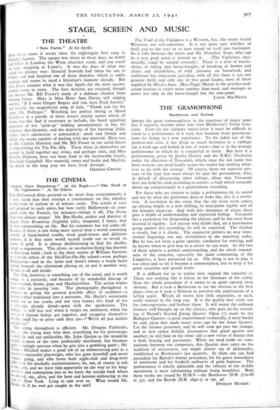THE CINEMA
"Angels Over Broadway." At the Regal.--ii The Trail of the Vigilantes." At the Odeon.
Few Hollywood films pretend to be more than entertainment; it is only rarely that they attempt a commentary on life, whether in the form of realism or of serious satire. The screen is very well adapted to such satire, but how rarely Hollywood—as com- pared with the French, for instance—brings it off; The Front Page was almost unique. Mr. Ben Hecht, author and director of Angels Over Broadway (frightful title), imagined, I fancy, that he was commenting on life. But his comment has not come off. Because, if there is one thing more unreal than a world consisting entirely of hard-boiled crooks, tired good-timers and delirium tremens, it is that same world turned inside out to reveal its hearts of gold. It is almost disillusioning to find the disillu- sioned so regenerate. This silver- or saccharine-lining has become an American habit ; look at the short stories of William Saroyan, or a dozen othersiof the No-Flies-On-Me school—even perhaps Hemingway—and in the latter end there's always a warm heart ticking beneath the chromium plating or, to put it another way, the nut is all soft inside.
This film, however, is something out of the usual, and is worth seeing as a curiosity, and because of its wonderful line-up of faces—bestial, blotto, gaga and Machiavellian. The action begins and ends in pouring rain. The photography , throughout is directed to giving the greatest possible effect of seediness—a morning-after translated into a nocturne. Mr. Hecht's wisecracks struck me as too voulu, and not very funny; this kind of wit Is perhaps already dated—gone with the speakeasies. The dialogue is still less real when it verges on sentiment, when the two poor human beings get together, and recognise themselves for the small fry or petty cash they are—" We're all just nickels and dimes."
The acting throughout is efficient. Mr. Douglas Fairbanks, iLlnl a, the young man who does everything for his percentage, Is credible and not unlikeable; Mr. John Qualen as the would-be suicide is most of the time profoundly moribund, but becomes quite winningly nervous when he gets into a gambling game ; Mr. Thom..; 's Mitchell makes a good job of an embarrassing part as a successful playwright, who has gone downhill and never st°PPe-: going, and who bores both night-club and drug-store alike ks .th his alcoholic sententiousness; he, too, of course is soft .at the core, and we leave him apparently on the way to his long- lost wife and redemption just as we leave the suicide back where Jae started, viz., alive, and the hero and heroine embracing in the 21n 01 New York. Long to rain over us. What would Mr. Hecht do if he ever got caught in the sun?
The Trail of the Vigilantes is a Western, but, like many recent Westerns, too self-conscious. It is not quite sure whether to thrill you to the core or to turn round on itself into burlesque. So it falls between the stools and Mr. Franchot Tone, who can
be a very good actor, is wasted on it. (The Vigilantes, inci- dentally, could be treated seriously.) There is a deal of knock- about, of falling into horse-troughs, of breaking of bottles and chairs and chandeliers, of wild pursuits on horseback, and exuberant but innocuous gun-play; with all this there is not one genuine thrill, and only one or two good laughs, most of these supplied by Mischa Auer. Miss Peggy Moran as the peaches-and- cream heroine is rather more tomboy than most, and manages to arrive not only in the horse-trough but the cow-pond.
Lours MACNEICE.






































 Previous page
Previous page